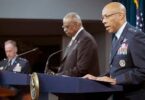F.P. Report
WASHINGTON: The Subcommittee will come to order. Welcome to today’s hearing, “Department of Defense Information Technology, Digital Developments, and Artificial Intelligence for Fiscal Year 2023.”
Today, we are joined by Mr. John Sherman, the DoD Chief Information Officer, serving concurrently as the interim Chief Digital & Artificial Intelligence Officer. He is joined by Ms. Margaret Palmieri, the Deputy Chief Digital & Artificial Intelligence Officer, and Dr. Kelly Fletcher, the Principal Deputy Chief Information Officer.
The position of the Chief Digital & Artificial Intelligence Officer is a new one at the Department of Defense, effective as of February. The CDAO “will serve as the Department’s senior official responsible for strengthening and integrating data, artificial intelligence, and digital solutions,” and at its outset, assumed responsibility for the three preexisting entities that our members will be familiar with – the Joint Artificial Intelligence Center, the Office of the Chief Data Officer, and the Defense Digital Service. While Mr. Sherman has appeared before us previously, he did so in his CIO capacity, and today marks the inaugural appearance of the CDAO in front of Congress.
For as long as I have served on this Committee, there has been a bicameral and bipartisan push to elevate the role technology plays in the Department, and to disassemble the artificial stovepipes that exist within the sprawling bureaucracy. In bringing the CIO and CDAO together today, the Committee is making clear precisely how important of a role technology plays in warfare, and that no single leader can manage it all. From data to operationalizing artificial intelligence to building resilience in our networks – these topics are just too vital to be foisted onto a single official’s already full plate. I applaud the Department’s leadership for taking this first step in creating the CDAO.
Next comes that vital pivot when the Department moves from concept to execution, and as the saying goes, “the devil is in the details.” The lion’s share of the CDAO’s duties were previously held by the Chief Information Officer, and future success will depend, in part, on the clear delineation of responsibilities between the CIO and CDAO. These are positions whose responsibilities will persistently sit adjacent to one another. It is critical that these “lanes of the road” are clear not only to one another, but to the Department, the rest of the Executive Branch, Congressional oversight committees, and our international partners and allies.
In addition to this delineation, I am eager to hear how the CDAO will organize its efforts. In inheriting three separate entities in the JAIC, Defense Digital Service, and the Chief Data Officer, the CDAO is poised to develop exciting new constructs and build expertise across teams that have previously been siloed. For instance, we have seen how critical good data principles are to building useful Artificial Intelligence models. Hence, it only stands to reason that the CDAO would be thinking about new ways to align the teams that had previously worked these problems in separate silos.
Finally, I hope to hear how both the CIO and CDAO will be working with the Services. While we finally have empowered CIOs within each of the military departments, there are not natural parallels for the CDAO. Will the CDAO’s engagement with the Services be directed at their CIOs, or are there other, more suitable positions for the CDAO to work with? There are many historical comparisons to show that all of the best efforts within the Office of the Secretary of Defense can be quickly stymied without commensurate efforts by the Services.
Again, I am excited to hear about all of these matters and more, but before proceeding, I want to remark briefly about Mr. Sherman and his CIO team. When he was with us last year, I put a spotlight on the frustrations that this Subcommittee was dealing with, specifically in transparency on the budget request and information technology matters with his office. In the year since – under John’s leadership – we have seen a remarkable transformation when it comes to transparency, increased responsiveness to congressional inquiries, and the timely delivery of products required by law. Too often, it falls to Congress to point out the shortfalls or failings of the Department of Defense, but when deserved, we should also acknowledge its successes, and I commend John and his team for its track record over this last year.
With that, I want to thank our witnesses for appearing before us today. I’ll now turn to Ranking Member Banks for his remarks.






